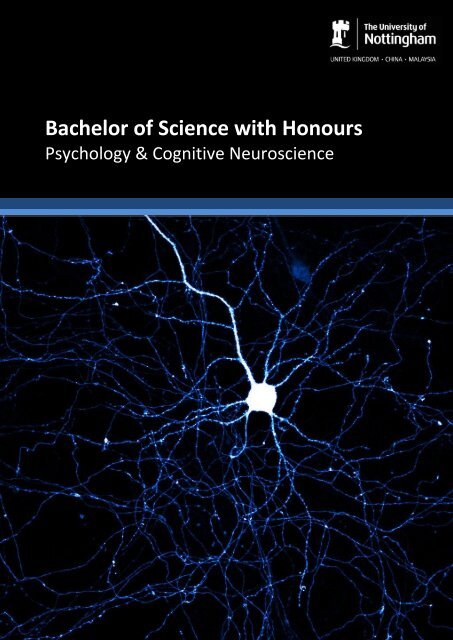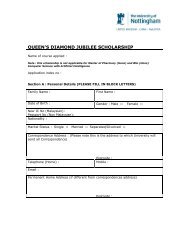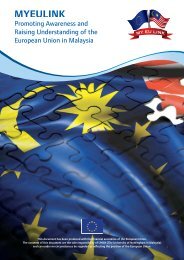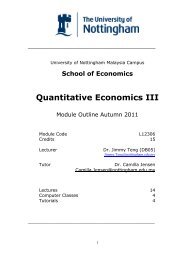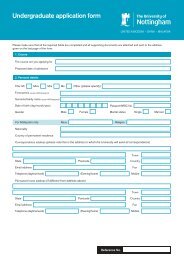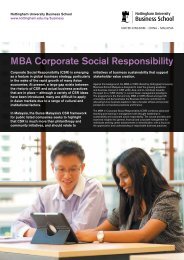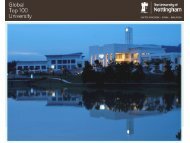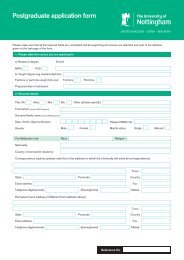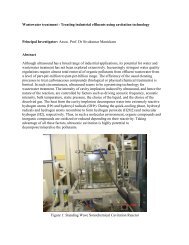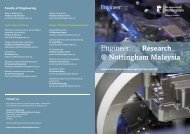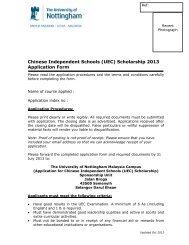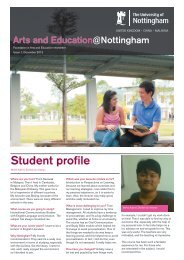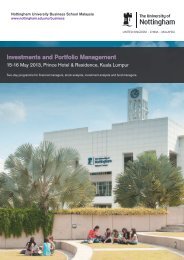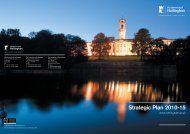BrochureC850PsychCogNeuro - The University of Nottingham ...
BrochureC850PsychCogNeuro - The University of Nottingham ...
BrochureC850PsychCogNeuro - The University of Nottingham ...
You also want an ePaper? Increase the reach of your titles
YUMPU automatically turns print PDFs into web optimized ePapers that Google loves.
Bachelor <strong>of</strong> Science with Honours<br />
Psychology & Cognitive Neuroscience
<strong>The</strong> award-winning Malaysia Campus is a full and integral part <strong>of</strong><br />
<strong>The</strong> <strong>University</strong> <strong>of</strong> <strong>Nottingham</strong> and <strong>of</strong>fers students the<br />
<strong>Nottingham</strong> experience in an Asian setting. It is a global<br />
institution serving an international community <strong>of</strong> students and<br />
yet is firmly rooted in all that is distinctive about UK education —<br />
innovative teaching and assessment methods that encourage<br />
independent, creative thinking. Quality standards are among the<br />
best in the world.
Welcome to the School <strong>of</strong> Psychology<br />
<strong>University</strong> <strong>of</strong> <strong>Nottingham</strong> Malaysia Campus<br />
Psychology is the science <strong>of</strong> mental processes - a broad and exciting topic<br />
covering the perceptions, thoughts, feelings and actions <strong>of</strong> people from infancy<br />
to old age. Cognitive Neuroscience is a related scientific discipline concerned<br />
with the study <strong>of</strong> the biological substrates underlying cognition, perception<br />
and action. It is multi-disciplinary; involving biology, psychology, medicine,<br />
chemistry, physics, computer science, engineering, mathematics and<br />
philosophy, and has a vast number <strong>of</strong> real world applications.<br />
Cognitive approaches to investigation range from field surveys to laboratory<br />
experiments, including studies that employ the latest brain imaging<br />
techniques. In 2003 <strong>University</strong> <strong>of</strong> <strong>Nottingham</strong> Pr<strong>of</strong>essor Sir Peter Mansfield<br />
was awarded a Nobel Prize for Physiology/Medicine for the development <strong>of</strong><br />
Magnetic Resonance Imaging (MRI), and we continue to conduct research with<br />
various cutting-edge neuro-imaging and eye tracking facilities.<br />
Students at the School <strong>of</strong> Psychology, <strong>University</strong> <strong>of</strong> <strong>Nottingham</strong> Malaysia<br />
Campus, not only enjoy studying Psychology and Cognitive Neuroscience, but<br />
also find the years <strong>of</strong> <strong>University</strong> life a very rewarding experience. Student life is<br />
rich in social, cultural and academic opportunities and we are very lucky to<br />
have an extremely diverse community, made up <strong>of</strong> people from many<br />
backgrounds. Our students come from all around the world. This gathering<br />
from countries with different cultures enriches the lives <strong>of</strong> everyone in the<br />
School, and is another indicator <strong>of</strong> the <strong>University</strong>’s very high international<br />
reputation.<br />
<strong>The</strong> School itself is outgoing, with connections with other leading Universities<br />
throughout the world, and in addition to studying on the BSc(Hons) degree<br />
course <strong>of</strong> Psychology and Cognitive Neuroscience, students admitted to the<br />
School may also have the opportunity to study abroad.<br />
We <strong>of</strong>fer a unique opportunity for students here at UNMC. I hope you will find<br />
your time in our School happy and rewarding.<br />
Pr<strong>of</strong>essor Peter Mitchell<br />
Director <strong>of</strong> Studies<br />
Dean <strong>of</strong> Science
BSc (Hons) Psychology and Cognitive Neuroscience<br />
Course Structure<br />
First Year<br />
Semester 1<br />
Cognitive Psychology 1<br />
Introduction to Social Psychology<br />
Semester 2<br />
Introduction to Cognitive<br />
Neuroscience and Biological<br />
Psychology 1<br />
Introduction to Developmental<br />
Psychology<br />
Full Year<br />
Practical Methods in Psychology<br />
Statistical Methods 1<br />
Second Year<br />
Semester 1<br />
Cognitive Psychology 2<br />
Conceptual & Historical Issues in<br />
Psychology and Personality &<br />
Individuals<br />
Semester 2<br />
Neuroscience and Behaviour<br />
Social and Developmental<br />
Psychology<br />
Full Year<br />
Practical Methods in Psychology<br />
and Cognitive Neuroscience<br />
Statistical Methods 2<br />
Third Year<br />
Full Year<br />
<strong>The</strong> final year allows for greater flexibility and in addition to taking 3 core<br />
Cognitive Neuroscience modules, students have the opportunity to choose from<br />
a variety <strong>of</strong> advanced topics.<br />
Research Project<br />
Final Year students are also required to conduct an independent research study.<br />
Students work closely with a supervisor to design, conduct, analyse and report<br />
on an experiment within the Cognitive Neuroscience field.
BSc (Hons) Psychology and Cognitive Neuroscience<br />
Entry Requirements<br />
Qualifications<br />
<strong>Nottingham</strong> Science Foundation<br />
Programme: Average 40%, with good<br />
grades in Mathematics<br />
A-levels: BBB in either Science or<br />
Art subjects (A-levels with a strong<br />
academic component will rank higher<br />
than those without).<br />
STPM: B+B+B+ or grade points <strong>of</strong> 3.33<br />
in at least 3 subjects, excluding General<br />
Studies<br />
SAM/AUSMAT/VCE/HSC: ATAR 86<br />
Canadian Pre-U: 85% average based on<br />
6 subjects<br />
International Baccalaureate: 32 points,<br />
with specified grades in Science or<br />
strong academic Arts subjects and 5<br />
points in Mathematics (SL).<br />
UEC: 5 As, excluding Chinese Language<br />
Other Qualifications will be considered<br />
on a case-by-case basis<br />
SPM/GCSE/IGCSE - Grade B in<br />
Mathematics<br />
English Language<br />
SPM: Grade A<br />
GCSE/ IGCSE/O Level: Grade B<br />
International Baccalaureate: 5 points<br />
IELTS: 6.5 (min. 5 in any element)<br />
TOEFL (PBT): 573 with TWE 4.5<br />
TOEFL (iBT): 88<br />
MUET Band 5 may be considered<br />
Scholarships<br />
Psychology High Achievers Scholarship<br />
<strong>The</strong> <strong>University</strong> <strong>of</strong>fers a 25% fee reduction for high achieving Psychology & Cognitive<br />
Neuroscience students in their first year <strong>of</strong> study.<br />
Chinese Independent Schools (UEC) Scholarship<br />
Competitive Full Academic Scholarships (tuition fees) are also available to eligible<br />
Malaysian students for the length <strong>of</strong> qualifying degree courses.<br />
Tinggi Foundation Scholarship<br />
<strong>The</strong> Tinggi Foundation <strong>of</strong>fers a scholarship to deserving students worth 50% <strong>of</strong> fees for the<br />
length <strong>of</strong> the degree course, provided that a minimum grade is maintained.<br />
Further details <strong>of</strong> all available scholarships can be found at:<br />
www.nottingham.edu.my/ProspectiveStudents/Scholarships/Index.aspx
<strong>University</strong> <strong>of</strong> <strong>Nottingham</strong> Malaysia Campus<br />
School <strong>of</strong> Psychology Academic Staff<br />
Pr<strong>of</strong>. Peter Mitchell – Director <strong>of</strong> Studies, Dean <strong>of</strong> Science<br />
Peter Mitchell is Pr<strong>of</strong>essor in Psychology and the Dean <strong>of</strong> Science at the <strong>University</strong> <strong>of</strong><br />
<strong>Nottingham</strong> Malaysia Campus. Previously, he was Head <strong>of</strong> the School <strong>of</strong> Psychology in<br />
<strong>Nottingham</strong> UK. He has published around 100 scientific articles in leading international<br />
journals, has written six books and is editor <strong>of</strong> the British Journal <strong>of</strong> Psychology. He has<br />
served as Chair <strong>of</strong> the Developmental Section <strong>of</strong> the British Psychological Society and<br />
as Chief Examiner for the Economic and Social Research Council UK PhD studentship<br />
competition. Before joining <strong>Nottingham</strong> <strong>University</strong> he worked at the <strong>University</strong> <strong>of</strong><br />
Birmingham, <strong>University</strong> <strong>of</strong> Oxford, <strong>University</strong> <strong>of</strong> Wales and <strong>University</strong> <strong>of</strong> Warwick. He<br />
also served as visiting pr<strong>of</strong>essor at McGill <strong>University</strong> in Canada.<br />
Dr. Elizabeth Sheppard – Deputy Director <strong>of</strong> Studies<br />
Dr. Sheppard studied Experimental Psychology at the <strong>University</strong> <strong>of</strong> Oxford before<br />
completing her Masters in Psychological Research Methods and PhD at the <strong>University</strong><br />
<strong>of</strong> <strong>Nottingham</strong>, UK. Her doctoral research used copying and drawing tasks to explore<br />
theories <strong>of</strong> perceptual processing in Autism Spectrum Disorders. Dr. Sheppard also<br />
spent three years working as a Research Fellow using eye-tracking methodologies to<br />
investigate driving abilities in Autism Spectrum Disorders. Her current research has<br />
two directions; perceptual processing in individuals with autism, including the<br />
perception <strong>of</strong> social stimuli such as people or faces, and driving skills - including the<br />
ability to identify hazardous events on the roads, and cultural influences on this ability.<br />
Dr. Kirsten McKenzie – Psychology & Cognitive Neuroscience Course Director<br />
Dr. McKenzie studied Psychology and the History and Philosophy <strong>of</strong> Science at the<br />
<strong>University</strong> <strong>of</strong> Auckland, New Zealand, before completing an MSc(Hons) and working as<br />
a Research Assistant at the Research Centre for Cognitive Neuroscience. She then<br />
moved to the UK to conduct research at Glasgow Caledonian <strong>University</strong>, and was<br />
awarded an Inter-Disciplinary Doctoral Training Scholarship to carry out her PhD in<br />
multi-sensory integration and spatial frames <strong>of</strong> reference at the <strong>University</strong> <strong>of</strong><br />
<strong>Nottingham</strong> (UK) Institute <strong>of</strong> Neuroscience. Prior to taking up her position in Malaysia,<br />
Dr. McKenzie also spent three years as Research Fellow at the <strong>University</strong> <strong>of</strong><br />
Manchester, UK, investigating perceptual integration and tactile illusions. Her current<br />
research encompasses various forms <strong>of</strong> multisensory integration and somatic<br />
misperception, using fMRI, EEG and the MIRAGE System.<br />
Dr. Neil Mennie – Visual Neuroscience<br />
Dr Mennie studied Neuroscience at the <strong>University</strong> <strong>of</strong> Sussex before completing a DPhil,<br />
also at Sussex. His doctoral research concerned eye movements and visual search in<br />
everyday tasks. After leaving Sussex, Dr Mennie gained extensive postdoctoral<br />
experience at the <strong>University</strong> <strong>of</strong> Rochester, USA, the <strong>University</strong> <strong>of</strong> Giessen, Germany<br />
and the <strong>University</strong> <strong>of</strong> <strong>Nottingham</strong>, UK. His research is in the field <strong>of</strong> active vision, and<br />
among his current research interests are the properties <strong>of</strong> anticipatory eye movements<br />
in everyday human behaviour, visual strategies <strong>of</strong> free ranging Orangutans and<br />
improvements in the vision <strong>of</strong> low vision patients as a result <strong>of</strong> contact lense therapy.
Dr. Jessica Price – Neuroscience <strong>of</strong> Aging<br />
Dr Price graduated from the <strong>University</strong> <strong>of</strong> Glasgow with an MA(Hons) in<br />
Psychology, an MSc in Psycholinguistic Research methods and a PhD in written<br />
language comprehension in healthy Ageing. She gained post-doctoral experience<br />
at both <strong>University</strong> <strong>of</strong> Strathclyde and the <strong>University</strong> <strong>of</strong> Glasgow, investigating the<br />
neural and cognitive mechanisms that are affected in early stages <strong>of</strong> Alzheimer’s<br />
disease, using dense array EEG/ERP techniques, before working at the <strong>University</strong><br />
<strong>of</strong> Birmingham. Her current research interests include: psycholinguistics, mismatch<br />
negativity, drug labelling, drug treatment effects, neurodegenerative diseases and<br />
EEG studies <strong>of</strong> cognitive function in elderly people.<br />
Dr. Matthew R. Johnson – Memory & Attention<br />
Dr Johnson received his undergraduate degree in Cognitive Science from Yale<br />
<strong>University</strong>. He worked for two years at a neuropsychiatry research centre before<br />
returning to Yale to pursue a PhD in Neuroscience, which he completed in 2011.<br />
His dissertation research used a number <strong>of</strong> functional Magnetic Resonance<br />
Imaging (fMRI), Electroencephalography (EEG), and behavioural studies to examine<br />
how attention can be utilized within working memory to enhance and/or suppress<br />
memory representations. Here at UNMC, his work extends this line <strong>of</strong> research<br />
with studies examining how attention processes within working memory operate<br />
similarly or dissimilarly to analogous attention processes in the domain <strong>of</strong> visual<br />
perception.<br />
Dr. Ian Stephen – Evolutionary Psychology<br />
Dr Stephen studied Human Sciences as an undergraduate at <strong>University</strong> College<br />
London, UK. He then went on to complete a Masters degree at the <strong>University</strong> <strong>of</strong><br />
Cambridge. From there he went to St Andrews, UK to complete his PhD;<br />
investigating the effects <strong>of</strong> colour and pigmentation on the perceived health <strong>of</strong><br />
human faces. Before taking up his position in Malaysia, Dr Stephen gained<br />
postdoctoral experience at the <strong>University</strong> <strong>of</strong> St Andrews and the <strong>University</strong> <strong>of</strong><br />
Bristol, UK investigating emotional facial expressions. His current research<br />
interests include cross-cultural differences in face perception, the impact <strong>of</strong> health<br />
behaviours on appearance, and the effects <strong>of</strong> skin colour on perceptions <strong>of</strong> people.<br />
Ms. Rika Imada – Psychological Assessment<br />
Ms Imada completed her undergraduate degree at Tohoku Gakuin <strong>University</strong> in<br />
Japan, before going on to study for a Master <strong>of</strong> Education and a Certificate <strong>of</strong><br />
Advanced Graduate Study from the School <strong>of</strong> Psychology at the <strong>University</strong> <strong>of</strong><br />
Massachusetts, USA. Before coming to Malaysia, Ms. Imada was working as an<br />
Associate Pr<strong>of</strong>essor at Shinshu <strong>University</strong>, Faculty <strong>of</strong> Education, Japan. She was<br />
also visiting Pr<strong>of</strong>essor at the <strong>University</strong> <strong>of</strong> <strong>Nottingham</strong>, UK. Ms Imada is a school<br />
psychologist and clinical psychologist. Her research interests include cognitive and<br />
perceptual processing in people with developmental disorders, as well as methods<br />
<strong>of</strong> psychological assessment.
For Enquiries about the BSc (Hons) Psychology and Cognitive Neuroscience<br />
Programme please contact the Course Director:<br />
Asst. Pr<strong>of</strong>. Kirsten McKenzie<br />
kirsten.mckenzie@nottingham.edu.my<br />
For enquiries about other programmes <strong>of</strong>fered by the<br />
School <strong>of</strong> Psychology please contact the Director <strong>of</strong> Studies:<br />
Pr<strong>of</strong>. Peter Mitchell<br />
peter.mitchell@nottingham.edu.my<br />
For enquiries about admissions please contact the<br />
Faculty Manager:<br />
Ms Salma Abd Kadir<br />
salma.abdkadir@nottingham.edu.my<br />
<strong>The</strong> <strong>University</strong> <strong>of</strong> <strong>Nottingham</strong> Malaysia Campus<br />
KPT/JPT/DFT/US/B19<br />
School <strong>of</strong> Psychology, Faculty <strong>of</strong> Science<br />
Jalan Broga, 43500 Semenyih<br />
Selangor Darul Ehsan, Malaysia<br />
+6(03) 8924 8000<br />
enquiries@nottingham.edu.my (Malaysians)<br />
international.enquiries@nottingham.edu.my<br />
http://www.nottingham.edu.my/Psychology<br />
Applications:<br />
admissions@nottingham.edu.my (Malaysians)<br />
int-admissions@nottingham.edu.my (Non-Malaysians)


